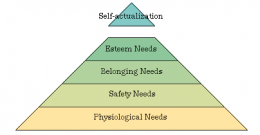 Having explored some of the definitions of ‘Development’ and ‘the Poor’ in the last blog we will now look at some of the differences between the world’s and church-based models. First, I would like to look at a variant of Abraham Maslow’s hierarchy of need.
Having explored some of the definitions of ‘Development’ and ‘the Poor’ in the last blog we will now look at some of the differences between the world’s and church-based models. First, I would like to look at a variant of Abraham Maslow’s hierarchy of need.
Maslow’s pyramid of need
Maslow was a psychologist who developed a theory of how our actions are determined by our physical and emotional states. In his pyramid he has five levels of need:
1. The physiological needs – food, water etc
2. The safety and security needs – protection including housing
3. The love and belonging needs – the need for belonging in a community
4. The esteem needs – personal recognition by the community
5. Self actualisation – to be what you are meant to be
In simple terms, Maslow suggested that each layer is supported by the one below. For example, having travelled in many poverty situations I am often struck by the way that just living consumes people’s time, whether it is looking for water or collecting firewood, may be walking 5-10km to achieve either, or building a shack out of very basic materials for protection from the sun and rain. Recently, in Guinea, I observed how people often do not know where their next meal would come from. Also, in such environments infant mortality is very high and life expectancy is short, perhaps under 40 years.
Christian Development
The above hierarchy of needs can be interpreted as a progression from Survival to Independence or, in Christian terms, from Survival to Active participation in Mission. So, how does this progression apply to Christian Development? The bible teaches that we each have potential in God, potential that was defined before the foundation of the world. So we can confidently state that His purpose for us would put us at the top of Maslow’s pyramid of need i.e. ‘being what we are meant to be’.
But what are we supposed to be? We are told that we should be a people who, like Jesus, look not only to our own interests but also to the interests of others (Phil 2:3ff). In other words we should be contributing to society, not dependent on it for our survival.
A study of Is 61:1-9, from which Jesus quoted in the synagogue in Nazareth (Luke 4:18-19) as his job description, shows this progression:
vv 1-3 from captivity to being ‘oaks of righteousness’ i.e. providing protection for others
v4 Repairing the ancient ruins i.e. contributing to rebuilding society
v5 Providing employment for others
v6 Becoming ‘ministers of our God’
v7 Transformed from shame to honour
v8 Covenant relationship with God
v9 International reputation and generational blessing
For the Christian, the gospel is the secret ingredient which is not available to the secular NGO or aid agency. At best the secular world can do a good ‘patch up’ job. But they have no resource to transform a person from the inside in order to help them realise their full potential. We will look further at this next time.

